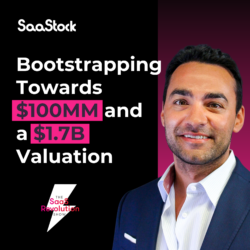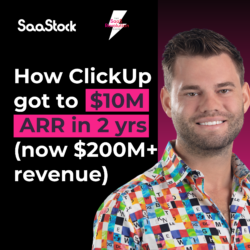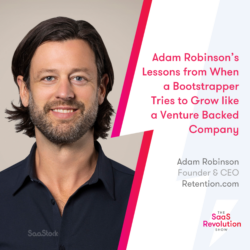If you are not subscribed, join the community by subscribing here and share it with your fellow SaaS enthusiasts.
Building your dream team does not happen overnight.
Before you can even think about creating a high performing team, you first have to put the right teams together.
And finding and attracting the right people, for the right roles takes time, energy and effort.
Watch now:
The three most important things to look at when attracting top talent are:
- Be clear on what top talent means to you.
- Nail down your interview process.
- Sell to the candidates more than they are selling to you.
Find out how you can do all three of the above in our How-To Series with Maddy Cross, Partner at Erevena (Talent Director at Notion VC at the time of recording), on our YouTube channel. You can also read the full transcript of this video below.👇
Transcript
Alex Theuma:
Welcome to the SaaStock how-to series in which we aim to answer questions posed by our community. I’m Alex Theuma, CEO of SaaStock, which helps SaaS companies get traction, grow, and scale by our community, conferences and content. And today I’m joined by Maddy Cross, the talent director at Notion VC. Welcome, Maddy
Maddy Cross:
Thanks, Alex. Nice to be here.
Alex Theuma:
Good to have you here. And, we’ve had you on the podcast before, had you and Notion speak at our conferences, and now for our how-to series. So, Maddy, the question asked by our community is how to attract top talent. And I thought you’d be perfect to answer this question. So, how do you attract top talent?
Maddy Cross:
Sure. So, there’s lots of different things to say about this topic, of course, but I’ve sort of narrowed it down to the three things that I think are the most important. So first, is getting clear on what top talent means to you. Top talent for somebody else may not be your top talent, and you really have to be very clear about what that means. For example, if you’re a seed stage business, someone who’s top talent at Google may not be the right person for you because they’re running with a huge brand and a big budget behind them. And vice versa is probably true, as well. But then also when you look at it from a sort of functional point of view, so let’s say you’re hiring a marketing manager, there may be someone brilliant at branding, but what you actually need is someone who’s got a really good understanding of marketing metrics and the marketing tech sex, completely different things. And, if you’re not clear on what your definition of top talent is for each particular role, it’s unlikely that you’d be able to find the best person for the job.
Maddy Cross:
And a couple of ways to kind of get around that. Have you written a specific job description? Are you really clear on what you’re recruiting for? Do you have goals or KPIs in mind that you want that person to take on if they come and join you? And then does the role title match the job description and those KPIs? One of the things that I often see in this role is that, somebody might be recruiting for a sales manager, but what they actually want that person to do is build an entire sales function and sales playbook, and in that case, you really probably need a VP sales or more around that. So, just have a think about all those things, job description, KPIs, goals, and does the job title match the job description.
Maddy Cross:
And then the second thing on my list, an interview process is really important. Going for a coffee with a candidate and kind of running through their CV is not an interview process. It may be one very small part of an interview process, but that alone is not the process. The way I always frame it for people, is to say that you should really have three stages to the interview process. One is, can they do the job? One is, will they do the job? And then the last one is, do you want them to do the job? And the “can they do the job part” is really the kind of functional part. If you’re looking to start selling into the US, has that person done that before? Would they know how to do that? So, it’s those kinds of questions, the functional and technical questions.
Maddy Cross:
“Will they do the job” is around motivation. So, if you’re a series A company and they’re really looking for something with a bigger budget or travel opportunities or whatever it is, then maybe that’s not right for them. And the last part, “do you want them to see the job?” That’s mostly about cultural fit for you. When you’re speaking to this candidate, did I seem like someone you could spend a lot of time with and work closely with? So, that’s kind of it on the interview process.
Maddy Cross:
And then the last one, is quite an easy one I think, because there’s not much process to it, other than, remember that you’re selling to them as much as they are selling to you, or maybe even you’re selling to them more. The really best people for the jobs that you’re recruiting for, once you’ve got that what top talent means to you part down, the really best people in that category are often very happy with their current employer or they’ve got other options on the table or if you make them an offer their employer will likely counter that offer. So, just remind yourself that you have to get them really hooked into the opportunity as well and portray to them why you’re excited about your business, so that, they can get the same level of excitement about it and be kind of looking forward to starting work with you.
Maddy Cross:
And I think it’s really that. So, it’s getting clear on what top talent means to you and for that specific job, have an interview process before you start meeting with candidates, and remember that you are selling to the candidates as much as they are selling to you.
Alex Theuma:
Are there any sort of specific resources or books that you would recommend on this topic? I hear Topgrading, sort of, referenced quite a lot. Would that be, in this particular example, is Topgrading a book and a process that would be befitting of an early stage startup as well as a scale-up? What are your thoughts around that and resources?
Maddy Cross:
Topgrading’s quite a chunky book, and so I think it’s very good and very detailed. But if you don’t have a couple of weeks to spend reading it, then you should look for a summary of it. So, we have an interview guidelines resource on our website that I wrote, for example, that spells out an interview process. So, as a kind of shameless plug, people can definitely look at that. But lots of other VCs have got a lot of content on this. I know Balderton have published stuff, Index have published stuff. So, there’s a lot of stuff out there.
Maddy Cross:
So what, I would say is in any one of those three topics, just Google it and see what kind of resonates with you, because there’s so much stuff written about this. And then, the other thing is, don’t be afraid to reach out in your network and ask talent acquisition people that are in your network, either at your investor or talent acquisition people that you’ve worked in the past to just ping you their recommendations for the specific role, or to at least possibly read over job descriptions for you, or write you some samplings for your questions, that kind of stuff, there’s always help around, I would say.
Alex Theuma:
Excellent. All right. Well, thank you so much for answering that question, posted by our community on how to attract top talents. Maddy Cross, talent director knows from Notion Capital.
Maddy Cross:
Thanks so much, Alex.







